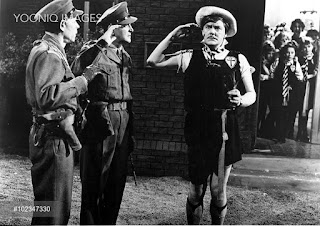Thorley Walters and the Dual Personality
Thorley
Walters appears in both ‘Blue Murder’ and ‘Pure Hell’, but unusually, he plays
different roles. Clearly there is meant to be continuity between the films –
Flash, Ruby and Sammy all appearing as the same characters in the first three installments.
Although there is the classic clanger of Miss Fritton’s change of first name
(she is Millicent in ‘Belles’ and Amelia in ‘Blue Murder’). But for some reason, Thorley was allowed to
appear as the army major in ‘Blue Murder’ and then Butters the education
department man in ‘Pure Hell.’
The
only reason that I can think of for this is that Thorley went down well with
Launder and Gilliat, and they thought him well suited to the role of a man in
authority who is brought to his knees by delinquent girls. Having carried out
some research on Thorley Walters (read my potted biography here) it seems that
he was a very easy actor to work with. He was never out of work and this is
testament to his talent and his employability. No tantrums, no ego, no scandal
(apart from the delightful rumour that he was Cecily Courtneidge’s toyboy) Thorley
was simply a grafter. His aptitude for comedy roles shows that he was not
afraid to make himself look daft – I bet he was a dream to work with compared
with wrangling Alastair Sim and a gang of adolescent girls.
Both
of Thorley’s roles are made to look ridiculous by femininity. In ‘Blue Murder’
his army Major enters the school to give the girls a jolly good talking to. He is
sent out again dressed in a gym slip. Meanwhile in ‘Pure Hell’ he is turned
into a gibbering wreck by the Shakespeare striptease and turns to a few
effeminate dance moves to calm his ragged nerves. The clear message is that
girls who do not behave are emasculating and if a man lets them win then he
degrades himself by becoming feminine too. So you’d best keep your girls under
control. The same could be said of Lionel Jeffries’ role in ‘Blue Murder’ – he has
to pose as a headmistress because the St Trinians mob have him over a barrel –
if he doesn’t do as they say then he will be turned over to the police as a
jewel thief. By being check-mated by the girls, he too becomes feminine and
finds it degrading.
Earlier
posts in this blog series laud Launder and Gilliat for being feminist film
makers, but here’s where they let themselves down. Being like a woman isn’t
that demeaning, is it chaps? After all we’d been though in the war? In the 1950s it was time to put us in our
place again…have we recovered yet?



